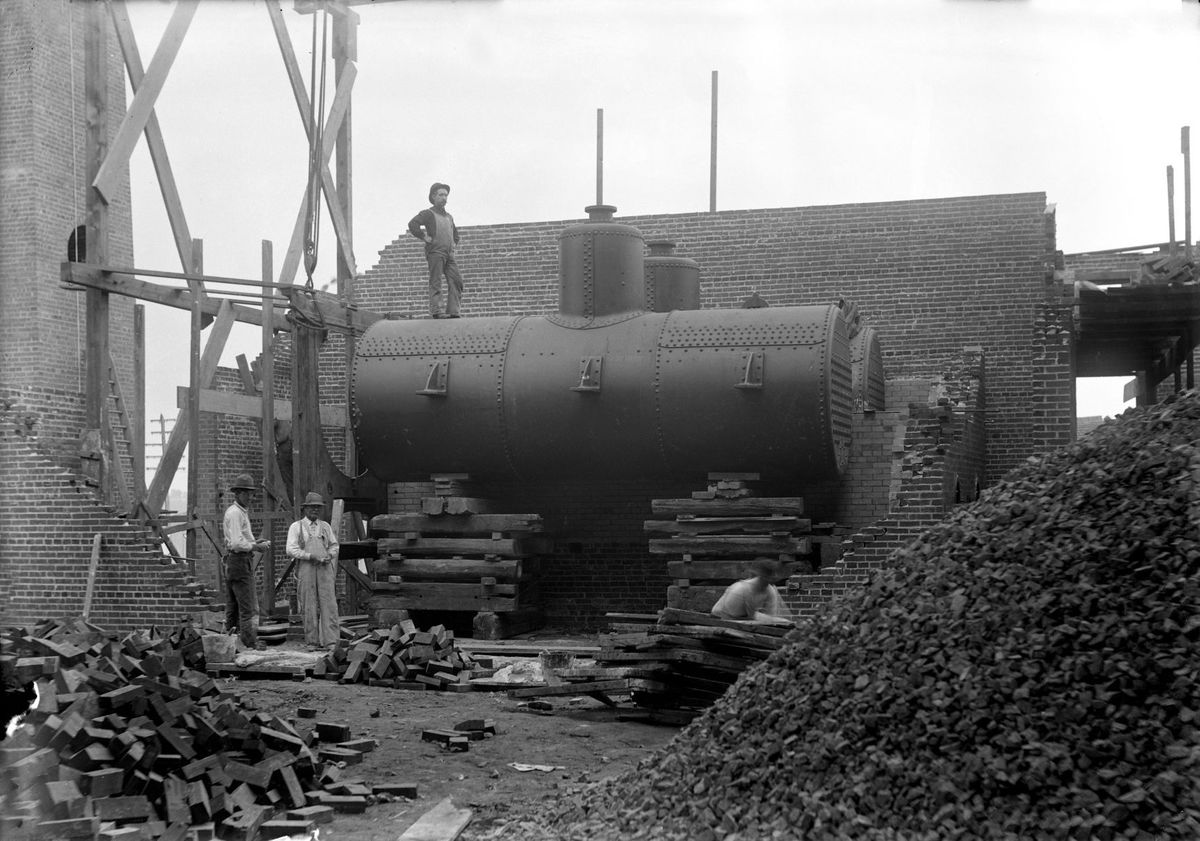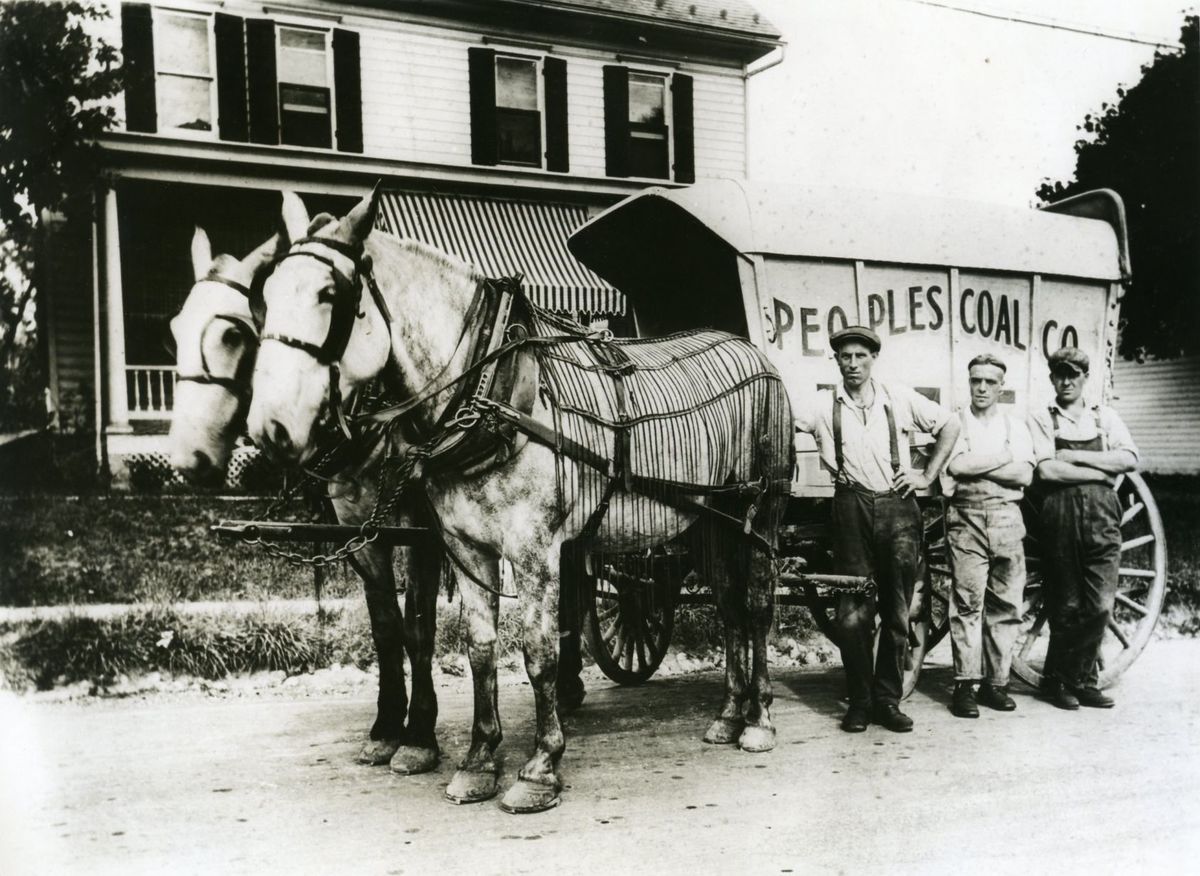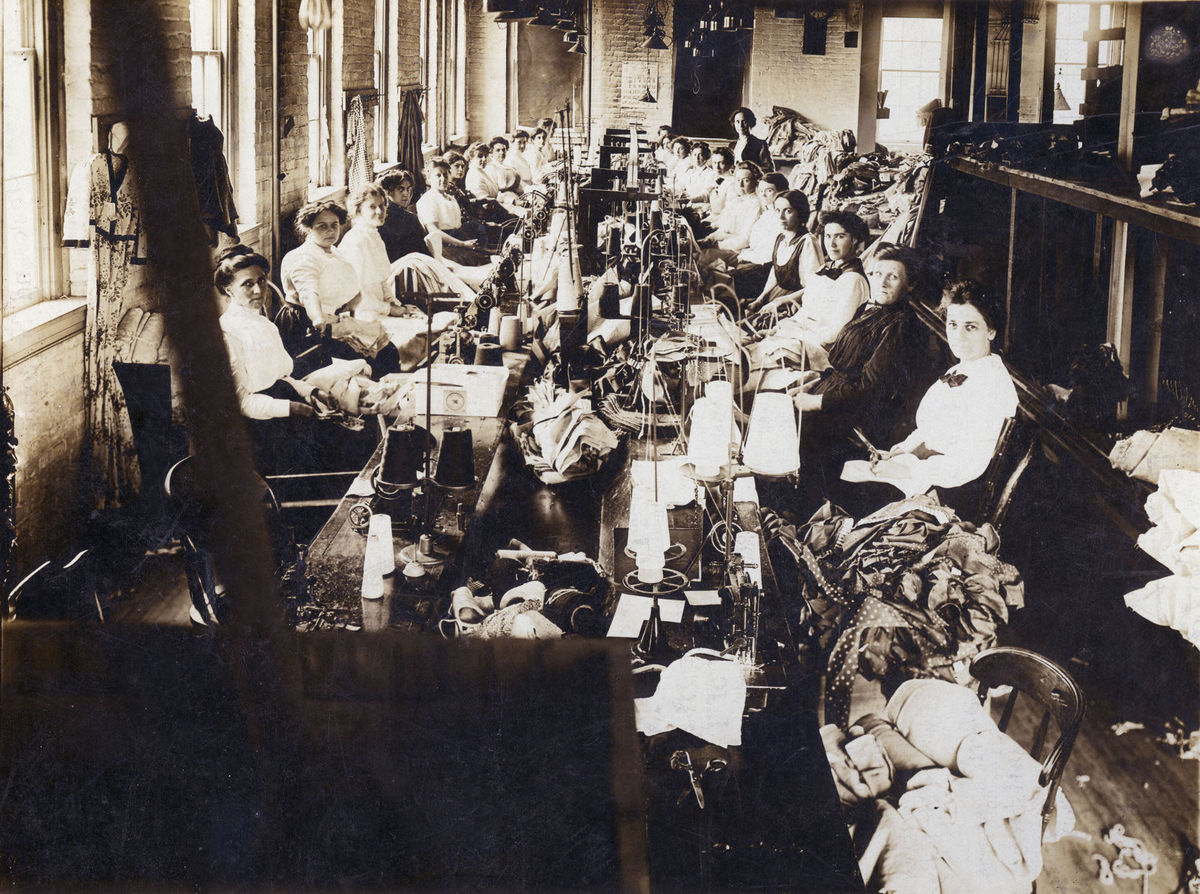Coal Crisis of 1918 Idled Factories in Carlisle, Pennsylvania, Entire Eastern US

By Joseph Cress
January 19, 2018 - Though how they did it was a mystery, the motive was understood.
One hundred years ago, someone removed about 50 tons of coal from a railcar in the Enola, Pennsylvania freight yard.

This scene from a Cumberland County brickyard shows a coal bank on the right and two large boilers in the background.
Photo courtesy of Cumberland County Historical Society
The theft that Sunday, Jan. 20, 1918, puzzled Pennsylvania Railroad Company officials investigating the crime scene in the east end classification section of the vast transportation hub.
It was well known that company workers were picking up and taking home nuggets of the black fuel that had jarred loose from trains passing through the yard. They needed the coal to keep from freezing during a major energy crisis brought on by the harsh winter, railroad backlogs and high demand from the military fighting World War I overseas.
“The fuel situation in this vicinity is growing worse instead of better,” The Evening Sentinel reported on Jan. 22. “Shipments of coal received in local yards are slightly below that of last month, which was about 1,500 tons below the normal demand.”
Just the day before, the newspaper announced that Victory Monday in Carlisle was observed “in excellent manner and with fine spirit.”
“All the stores, offices and factories covered by the Fuel Administration order closed their doors,” The Sentinel reported on Jan. 21. “[This] saved many tons of coal and relieved the railroads of 24 hours work.”
Coal Order Issued
More than a week had passed since the federal government issued the order declaring that every factory east of the Mississippi River close down and cease operations from Jan. 18 to 22. This included all war production, but excluded food manufacturing. The states of Minnesota and Louisiana were also made part of the ban.

The Peoples Coal Company makes a horse-drawn delivery to a local home circa 1921.
Photo courtesy of Cumberland County Historical Society
“By this mean all industries will be placed on an equal footing and each will be called upon to make its share of the sacrifice necessary to maintain the nation at the highest possible point of economic and military efficiency for the prosecution of the war,” the order reads.
The goal was to make sure there was enough fuel to heat homes and essential operations and to power ships moving war supplies overseas. Aside from industry, certain restrictions were placed on most everything commercial to reduce the demand for coal and to ease the burden on the overwhelmed supply line.
For example, grocery and meat stores were allowed to stay open but only until noon and drug stores were only allowed to sell medication. Downtown merchants were not allowed to heat the store portion of their building, but were allowed to heat the apartments where they lived.
There were many exceptions to the rule. Hospitals, medical offices, public utilities and government offices were allowed to stay open. So were banks, trolleys, trains and newspapers. Theaters and motion picture houses were also exempt – perhaps in an attempt to maintain civilian morale. But those businesses had to close on Tuesdays.
The same order that closed all factories for five days also fixed every Monday for 10 weeks afterward as a holiday – again in an attempt to counteract the coal famine.
“On such days all theaters and places of amusement are required to close their doors,” a wire service story from Jan. 17 reads. “Other non-essential businesses must curtail their activities. Newspapers are limited to a single edition.”

Workers at the Carlisle Garment Company. A severe coal shortage in January 1918 prompted the federal government to issue an order to shut down production at most factories east of the Mississippi River.
Photo courtesy of Cumberland County Historical Society
A directive issued through Harrisburg from the federal government clarified that Carlisle schools should remain open on Mondays during the crisis. There was some confusion because an official in Philadelphia interpreted the order to mean that schools should be closed on Mondays.
There had to be mixed interpretations on how the federal order applied to schools. The same newspaper article that described the theft of 50 tons of coal mentioned how the closing of local schools on Monday, Jan. 21, saved a small amount of the fuel.
Garfield Under Fire
Responsibility for the Fuel Administration order fell on its chief executive officer, Dr. Harry A. Garfield, who became a target for criticism. The Sentinel editorial board published a series of columns from Jan. 16 to 21 defending the rationale behind the order and urging local residents to comply with the directive.
“It is better to call the surgeon than the undertaker,” a column from Jan. 16 read. “In other words, if the country does not submit to this operation, it may mean fatal disaster later on.
“We must assume the officials at Washington are so much better informed than private citizens that they are better able to judge the needs of the situation,” the column continued. “Privately we may not think the Fuel Administration knows what it is about, but at the same time we would advise everyone to enter into the arrangement in a proper spirit of cooperation.”
On Jan.18, the board wrote that instead of criticizing Garfield, it made more sense to commend him for his bravery “in taking the bull by the horns.” “It seemed that the whole [Wilson] administration wanted the order made, but that it fell to Garfield to make it and bear the brunt of the criticism.”
A companion editorial mentioned that while the “storm of criticism” proves America has a strong democracy, where people should not hesitate to speak their mind, the criticism itself was not well founded in fact.
One critic railed on Garfield for not having surplus coal stockpiled at strategic shipping locations. The Sentinel responded “Very nice, but what would the world have done while he was storing the coal?”
Another critic said that, under the order, factories would fall behind in meeting manufacturing quotas. The newspaper batted back “Again very good, but what is the difference between falling behind under this order [and] falling behind for lack of coal?”
Perhaps the sharpest criticism had to do with the burden the order would place on laid-off factory employees. “Garfield was as fair as he could be,” The Sentinel column read. “If he could have order the wages paid he would have done so.
The Order Worked
Three days later, on Jan. 21, the editorial board mentioned how most civilians now view the order as necessary and saw its effects as positive.
“Railroads are already feeling the relief, ships are moving out of the harbors with supplies for the army aboard and dwelling houses have been able to get coal easier than before. It should teach us a lesson along the line of making sacrifices for the nation’s good and also along the line of supporting our officials in all their acts.”
Naturally, politics entered into the picture. The Sentinel mentioned that Republicans in the House went to great pains to prove that Dr. Garfield was not a Republican because he supported a Democrat in President Woodrow Wilson.
“His political status makes little difference to the issue involved,” The Sentinel board said. “But it may be that in the future the Republicans would be glad to take credit for him.”

